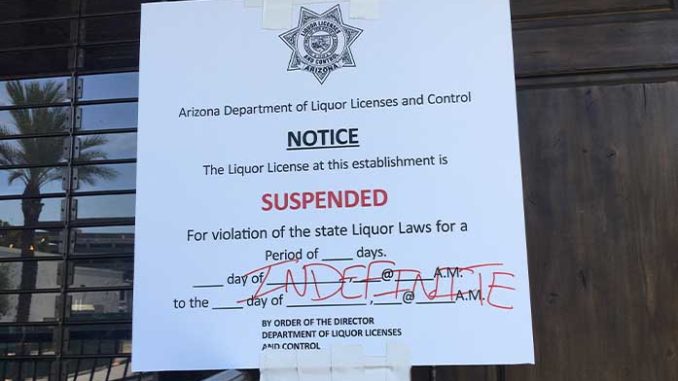
Last week’s suspension of the liquor licenses for two Scottsdale bars accused of violating social distancing mandates comes as the owners of another popular bar are set to appear in Scottsdale City Court this week on criminal charges for violating state law in June by “not properly enforcing” social distancing and mask-wearing mandates.
 Bottled Blonde and Casa Amigos were shut down by the Arizona Department of Liquor Licenses and Control (ADLLC) and Arizona Department of Health Services (ADHS) for putting “the health, safety and welfare of the public” at risk. The “indefinite” suspension came just hours after both bars reopened Thursday after being shuttered since June by one of Gov. Doug Ducey’s executive orders.
Bottled Blonde and Casa Amigos were shut down by the Arizona Department of Liquor Licenses and Control (ADLLC) and Arizona Department of Health Services (ADHS) for putting “the health, safety and welfare of the public” at risk. The “indefinite” suspension came just hours after both bars reopened Thursday after being shuttered since June by one of Gov. Doug Ducey’s executive orders.
For months, state officials have warned bar and restaurant owners to comply with COVID-19 social-distancing guidelines or face possible action against their liquor licenses. Bottled Blonde and Casa Amigos were among several bars called out by public health officials in June for poor compliance with infection-mitigation guidelines.
Then on June 29, the governor ordered all bars to close until further notice. Ducey recently announced a phased-in reopening process for some bars but those wanting to reopen must openly post an “attestation” of their plans for protecting customers and employees from COVID-19.
The process allows bars/saloon with on-site food service to reopen in some counties but bars/saloons which don’t have on-site food service must remain closed, despite their ability to comply with public health regulations.
Last Thursday was the first day Bottled Blonde and Casa Amigos could open. It will now be up to ADHS officials to determine when both establishments can reopen and then ADLLC will have to reinstate the liquor licenses.
It’s unclear whether criminal charges are under consideration against parent company Evening Entertainment Group for the violations which state officials say were witnessed after the reopening.
One popular Scottsdale nightspots that hasn’t reopened is Riot House, whose parent company 4425 Saddlebag 2 LLC must appear in city court Sept. 3 for a hearing on a criminal citation issued June 22 after Scottsdale police officers claimed to have observed staff members and customers not wearing face coverings nor practicing social distancing.
The citation alleges that the company violated ARS 26-317, which reads in part that any “person who violates any provision of this chapter or who knowingly fails or refuses to obey any lawful order…as provided in this chapter shall be guilty of a class 1 misdemeanor.”
A corporation is considered a “legal person” and as such can be charged with criminal activity. The key difference is that corporation cannot be incarcerated, and its corporate officers or members cannot be jailed unless convicted as an individual. However, a corporation can be fined or have its various business licenses suspended or revoked.
The day after Riot House is in court, a hearing will be held in Maricopa County Superior Court in a lawsuit filed by Ilan Wurman of the Sandra Day O’Connor College of Law on behalf of 150 bar owners who are challenging Ducey’s executive order which is keeping thousands of bars closed across Arizona.
The civil court action seeks a temporary restraining order and preliminary injunction preventing some holders of liquor licenses to be treated differently from others. A hearing is set for Friday, Sept. 4 on whether the judge can block Ducey’s executive order.
Those involved in the lawsuit are owners of Series 6 or 7 liquor licenses, which is mostly bars which do not have to sell a minimum amount of food as part of their business. They are also allowed to conduct “off-sale” business, which is selling packaged alcohol for consumption away from their location.
Meanwhile, the holders of a Series 12 license are usually restaurants that are allowed to serve alcohol in addition to food. There are no required attestations for restaurants.
According to Wurman, if one type of liquor establishment can be selling booze, they all should. He argues that state health department and state liquor department officials have shown no correlation between an establishment’s type of license and its ability to comply with public health guidelines.
RELATED ARTICLES:
Maricopa County Health Official Admits Manipulating COVID-19 Deaths
